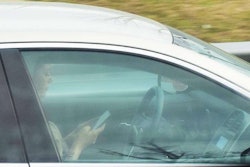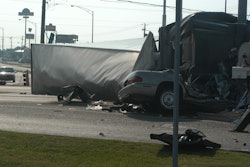My colleague Gary Buchs recently invoked the dynamic of a seemingly daily onslaught of a new proposed regulations or legislation to create regulations. The nature of Buchs’ story was this dynamic’s distracting nature for us, sometimes, when it comes to the needs of our own businesses. I would add that in our constant fights to repel unwarranted efforts put forward in the name of safety (speed limiters that would increase car-truck interactions, massive insurance increases that would do little more than put the smallest carriers out of business), too many are distracted from where a big trucking safety problem lies.
It’s in a different kind of distraction entirely: that of the motoring public we share the road with.
Comparatively, truckers are seldom the cause of accidents, as various studies have shown through the years.
We are tackling a battle over speed limiters, never mind the fact that common sense, and this or that study, shows that such a move would increase interactions between trucks and four-wheelers, which to my mind can only increase the risk of accidents.
Ambulance-chasing lawyers have weaseled a proposed bill into House of Representatives that would increase insurance coverage, with not regard to the damage it would cause to the industry and small business.

If manufacturers thought rates were stupid with the introduction of ELDs and the capacity that cut into, wait until hundreds of companies go out of business due to an increase in insurance rates and slowing down trucks to delay deliveries.
Still, there is some validity to pursuing an increase in true safety measures. Fatality rates involving big trucks (not considering fault or even preventability) have increased in recent times. I find it kind of coincidental that within the same time period, the incidence of distracted driving-related accidents have overtaken drunk driving accidents among members of the motoring public. Drunk-driving accidents appear more severe, killing more people, but the problem of distraction results in more accidents — the issue is plain to see. Every day I see car after car pass me with a driver on the phone, manipulating the device in hand and driving with their knees.
When in the cities I often need to honk my horn ten times or more because someone is on the phone at a light. Which increases the chance of road rage and the one-finger salute.
For committing the distraction sin, so far it seems truckers are hammered much harder in fines compared to the general public, which as a professional I can understand. Still, it is so lopsided there is really no reason for four-wheelers to take such matters seriously.
The last I heard the fine for truckers using their cell phone without a hands-free device is up to $2,750, potentially $11,000 for their company. After a fine like that, most companies will terminate the driver, who might be unlikely to be hired by another company until the offense is off their record — 2 to 3 years. Four-wheeled operators may suffer an increase in liability insurance rates, but by and large they won’t lose a job over the offense.
Currently, fines for the general public vary from state to state from $0 to $500, with only three states at that highest level. It is my belief and I am not alone in thinking that until government entities take the matter seriously, accident rates between trucks and cars will continue to increase. Even so, safety advocates are not pushing for that to happen.
Which brings me to a challenge: As a member of the OOIDA, Trucker Nation and WIT, I would suggest that these organization should not solely be fighting for and advocating for rights. These organizations should be fighting more squarely for the safety of truckers as well. Perhaps, just maybe, these organizations can team up with insurance companies to propose a bill to make it mandatory for an app to be installed on phones to help prevent texting and driving — stiffer penalties for doing so, at the least.
Is it outside the realm of possibility that, since more crashes appear to involve distracted driving as a cause than drunk driving, penalties should be as significant as a DUI? A few things to think about.











